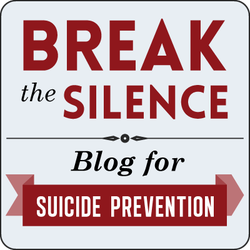Brain's Blog
 Suicide Prevention Week – My Testimony By Jabari Evans Suicide prevention is much like HIV and Cancer prevention in that most people look the issue in a reactive rather than proactive manner. As a burgeoning mental health professional, my graduate course work has also often approached suicide from a similar way using very dry and clinical perspective to instruct students how to interview those who present as suicidal. Suicidal ideation, from a practitioner’s perspective, is taught to be inquired about head on. Clinicians are taught to recognize signs for clients that indicate sadness, loss of interest in their normal everyday activities, sense of hopelessness and a history self –injury. Although this would seem easy enough, suicide prevention can often be problematic. This is particularly so in the African American community because suicide tends to be more of an impulsive than planned act for African American individuals, specifically those whom are college educated. Historically suicide prevention practices for African Americans have been limited as the rates of suicide death for the African American community have been lower than other ethnicities. However that gap is decreasing and African Americans, especially males between the ages 15-24, are committing more suicides than ever before. Rates of Suicidal Ideation are rising amongst Blacks and suicide is now the third leading cause of death among African Americans between the ages of 15-24. In one study, out of a sample of African American college students at a predominately black college, nearly one half of the students, 49.3%, reported both previous or current suicidal ideation and 10.7% reported previous suicide attempts (Molock, Kimbrough, Lacy, McClure, & Williams, 1994). Another study found that from their African American sample: 9.3% had made suicidal threats, 3.1% had made a minor suicide attempt, and 2.6% had made a serious suicide attempt (Gutierrez, Rodriguez, & Garcia, 2000). This issue of suicide prevention among African Americans is one that is of special interest to me due to personal tragedies that I've suffered in recent years. As a clinician at my family’s practice in Chicago, we have been unfortunate to have to go through the experience of losing two of our consultants (both African American) to suicide in the past 10 years. Besides the emotional implications, we were left to wonder whether we as mental health professionals should have seen the signs among our own colleagues or whether the environment we were providing was a contributing factor to these individuals feeling like life was not worth living anymore. At these moments, we had to step outside of ourselves as mental health professionals and realize that suicide prevention is about much more than recognizing the clinical signs that may present in people around us but in being genuinely empathetic to the needs of the people in our lives and not taking the stance that resilience amongst our population is a given simply because these people give us all the “right” answers. One of the first conversations I ever had before I entered graduate school with was with my father, a doctorate level clinical social worker and my best friend, and he asked me with a straight face: is this REALLY what you want to get yourself into? This was not exactly the response I was looking for so when I asked him what he meant, he told me that social work was one of the few fields in which being in tune with one’s own identity and personal hang-ups is mandatory in order to successfully treat clients consistently and not "go crazy." He explained this is so much so that he recommended that I see a therapist before I entered into my first field practicum. Although I was initially alarmed by his concern, I’ve come to realize that this pre-emptive caution is often the hallmark of a good social worker. As members of the social work profession, we often fail to put ourselves in the equation of care and put our client’s struggles before those of our own. This sobering fact was confirmed when my family and I were left to attend funerals two consultants that seemed so great at treating others but were doing so in the midst of hidden personal turmoil. In my opinion, suicide has always been a taboo subject within the African American community. Our community socializes us to believe that suicide is not a "black thing" and suicide is not something that our people participate in. African-American suicide rates have traditionally been lower than White rates despite a legacy of racial discrimination, persistent poverty, social isolation, and lack of community resources. However, patterns and trends of Black suicide across the lifespan indicate that there are a number of risk and protective factors in subgroups of Blacks. These risk factors for Black suicide include: male sex, early adulthood, substance abuse, psychiatric disorders, family or interpersonal conflict, antisocial behavior, and homosexuality. I believe that although suicide isn't a epidemic in African American community, street gang activity, drug and alcohol abuse, sexual abuse and domestic violence are running rapid in the inner city and is related to a similar conscious level of learned hopelessness that many suicide victims are facing. In my opinion, choosing a life path that constitutes a slow death is just as harmful as grabbing a gun and simply pulling the trigger on yourself. Suicide Prevention Week is now upon us and although it may seem like a moment to try to educate African Americans on the signs of people with suicidal ideation, I look at this week as a moment for us to take time for self-reflection. A moment to make a more concerted effort to be more genuine to those you truly love and care about and try to be empathetic to associates that you see are in distress. You just may save a life. References
1 Comment
Leave a Reply. |
AuthorRaised on the East side of Chicago. Globally Local. Cheers! Archives
January 2024
Categories |


 RSS Feed
RSS Feed

